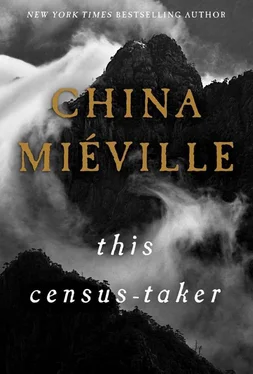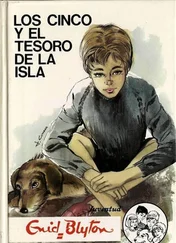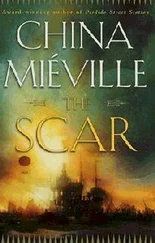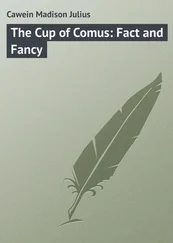Each time I entered it the room beside mine was less and less my mother’s. I had a few of her books, but they’d been mine too, at least to use, in my care, by the time she gave me them outright by leaving, so I never felt I was connecting with her when I opened them.
The days changed and the view from what had been her window became mine. I climbed into its frame as I had once in the attic that I didn’t want to enter again. When the wind made my house lean and creak at night, I’d look up and imagine that the sounds were made by my mother shaking the walls in the upper room, staring at where the blood had been, that my father had cleaned away. I still tried to keep her face from my mind, and sometimes I succeeded and she looked at me with my father’s face or the rotting doll’s.
Once as I sat at what had been her window in cold late light I heard two shots in fast succession. They came from somewhere on the stone slopes.
At the first I didn’t even move; I was used to the sound of shotguns. What followed it, though, was a sharper ugly echoing crack like the amplified snap of dry wood. It made me start and look wildly through the glass at the flocks of birds as spooked as I.
I waited, but nothing more came.
When my father shouted for me from the front door I still hadn’t left the house and I surprised him by descending from behind him, down the stairs. I was surprised in turn because two downhillers stood on our doorstep: a thin nervous man I didn’t recognize with one of the ribbons of temporary office on his shoulder and a revolving pistol in his hand, and the sour-looking teacher.
My father looked at them, past them to the horizon for long seconds, then faced me. He was angry.
“How are you?” the woman shouted at me.
I backed away from the door and nodded without speaking.
She came in while her companion fidgeted with his weapon. She looked in my eyes and mouth and asked me whether I was all right, whether anything had happened, while my father watched and listened.
When they left she said to him, “You be careful.”
He closed the door more slowly than usual, so as not to slam it.
When he ladled out supper my father said, “Did you hear the gun today? That loud shot?” I nodded. “Not heard that noise for a long time.” He frowned. “Could be there’s new hunting, maybe.” He opened the door and looked out while midges joined us. “I used to hear that all the time,” he said. “When I was in a war. In a city.” Not the nearest one, I knew.
The boy said, “Who won?”
“High town against low?” the boy’s father said at last. “Street against street? Who won?” He looked at his son without expression. “ They won. That shot? That’s the kind of shot you use to kill a man.”
That night I ran away.
It was very cold and I put on my heaviest clothes to descend the stairs and step as silently as I could onto the flat rock around our house and onto the path, to come down that hill. I shook hard with every step, even with all those layers. I was dry and dusty. In the very far distance, in the steppes on which I’d never trodden and to which I rarely paid attention, lightning soundlessly connected sky and earth. My skin felt like old paper.
I didn’t feel brave walking that path, though I had no flashlight and I strained to see by a slice of moon. If I’d stepped onto scree or braced against the wrong rock I might have started to slide and not been able to stop, and if there was no fence below me at that point I might have kept descending until I went over an overhang into a gulley, falling to my death.
By day there’s rarely anything on the hill that would take you, but whether or not there are those things about which the bridge gang asked me, there are predators after dark, the nightcats and others. They might hunt a child. Coyotes and pumas wouldn’t enter the streetlit town but they might have investigated me on my way to it. I don’t remember feeling fear or determination or anything but as cold and as drab as the earth as I came down.
A clattering made me stop. No animal came, but standing in the dark where the path on my little mountain widened and grew shallower in the angle of its descent, I heard that percussive scratching. What I’d thought the sounds of new birds, closer now, as if something was bringing up gravel in short coughs. I didn’t move.
On that hill, there were none of the true succulents of the desert, that I knew from pictures, that I’d once imagined walking. But there were spined trees, various clotted-looking things serrated as if with claws along the ridges of their bark. They surrounded the dark path and I peered between their spines.
Deep in a clag of them, I saw a human shape.
The figure seemed to approach me like someone rising out of water, a hulk of shadow with a box and a gun. It seemed to surveil me, and move without moving.
I hollered and I ran.
I didn’t know if I’d seen anything real, because the hill will throw up its own nightmares, and I didn’t care, just ran in great terror and didn’t look behind me.
Nothing seemed to follow, but I didn’t slow.
When at last I came slap-footed and quaking into the bridgetown it was still deep night. There were few people in the streets, dim but definite figures visible at junctions at work in their economies. They looked at me in curiosity. They couldn’t have seen my face and it wasn’t as if there were no ragged children in the town, nor as if none ever went walking in such forbidding hours. No one called to me.
I took a twisting route, striving for silence, returning to the bridge over the cut, to Samma and Drobe’s favorite house.
My hope was met: the door opened. I stood in the threshold. My eyes were wide and I felt as if they might shoot out rays for me to see by. I stood half-in half-out, unsure how to proceed, and Samma opened her own eyes to look at me.
“Oh, you,” she said. “It’s you.”
She rose and came for me. She was sleepy and vague and she held out her hand and whispered to me with more tenderness than I’d heard from her or anyone, now it was only she and I awake and she was unheard by the tough brood she helped shepherd.
—
She whispered to you the story of when you came down, to calm you. You had a childish hope of sanctuary right there in that airy ruin but Samma knew better and pulled herself all the way awake and warned you, finger to her lips. She thought. She put her hand on Drobe’s chest and brought him instantly out of sleep. They murmered.
She said to you, “Is anyone coming?”
“I think someone was on the hill.”
Some other gang children looked up from where they lay at the quiet caucus. Drobe and Samma pointed them back to sleep and they pretended to obey.
Samma leaned out and scanned the bridge. A light rain now fell. “Come on,” she whispered to you. “Come on right now.”
Watched by those silent comrades, Samma and Drobe took you to your dismay back out into the night. You could see the lines of the country now, rising into quickly ebbing darkness, the hills’ shoulders coming visible. Each streetlamp wore a corona.
Your guides surprised you. They took you left, above the bats’ arches, to cross the bridge. Past that dark cart, as absolute in its aspect as any rock, into the southern half of the town. A street slanted up. They took you higher. Your skin was wet.
It was as if dawn had been told to come quicker on that side, as if the greater emptiness of the streets sucked the light in. What watchers you noticed may as well have been dispassionate observers from some austere alternative, so opaque were their regards. Destitutes lying but not asleep under leaves in a graveyard, marking you from their locations, cozied up to the railings as if to give the dead their room. In a chair by her open doorway a woman waited for the sun and nodded as your escorts took you past. You cried out because something terrible clawed from her mouth, a dark tangle, as if something hookfooted was emerging from her and she didn’t care.
Читать дальше












